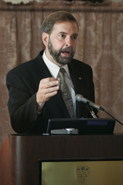Biodiversity synthesis
International environmental report launched at McGill

Thomas Mulcair, McGill grad and Quebec's minister of sustainable development, parks and environment, speaks about Quebec's ecosystems at the launch of the biodiversity synthesis
Owen Egan
The report is in and the news isn't pretty. Devastation. Depletion. Anticipation of failure. This grim litany was delivered to international dignitaries, government policy-makers and McGill scholars who filled the Faculty Club Ballroom on May 19 for the launch of the biodiversity synthesis report.
The report is part of the Millennium Ecosystem Assessment (MA), a massive undertaking of close to 1,400 of the world's top scientists, who were asked by policy-makers from around the globe to give an accurate snapshot of the state of our interconnected living environment. The report went through a double peer review, and is considered definitive.
The information within the MA will help governments decide what actions to take to ensure a healthy sustainable lifestyle for all. The Montreal-based office of the UN Secretariat for the Convention on Biological Diversity (CBD) sponsored the specific report on biodiversity. Thanks to the collaboration of McGill — particularly the event's co-sponsor, the McGill School of Environment — CBD chose the university as their launching pad for the report.
Walter Reid, secretary of the MA, described biodiversity as the variability among living organisms from all sources, including diversity within species, between species and of ecosystems. "Essentially, life on Earth," Reid noted. The comprehensive report is unique, he said, because of the links it draws between ecosystems and people.
The findings are bleak. Some 12 percent of bird species, 23 percent of mammal species, 25 percent of conifers and 32 percent of amphibian species are threatened with extinction, mostly due to human causes. And since industrial fishing began, the world's fish stocks have been reduced by an astonishing 90 percent.
A thriving biodiversity benefits humans by providing the ecosystem services we need to live. These include food and fuel; regulation of climate and disease; enhancement of quality of life through aesthetic, educational and recreational spaces; and maintenance of soil formation and nutrient cycling.
Hamdallah Zedan, the executive secretary of the Convention on Biological Diversity, said the mismanagement and degradation of biodiversity plays a role in all matters of environmental trauma, from Newfoundland's depleted cod stocks, to the extent of the devastation caused by last winter's tsunami in Southeast Asia (clearing mangrove forests had removed a natural buffer against the waves). The CBD has set ambitious guidelines to reduce the rate of biodiversity loss.
But there is a huge challenge ahead. Three billion people live on less than $2 a day. On the eve of this millennium, the UN set targets to reduce poverty worldwide. How do we lift people out of poverty without further straining our ecosystems? Developing countries note that wealthy countries have already benefitted from their wanton use of ecosystem services — what about their kick at the resource can? The poor don't have access to substitutes that the rich do: they can't move somewhere else if an ecosystem fails, or shore it up with expensive technology.
Anantha Duraiappah, co-author of the Biodiversity Synthesis, pointed out that 60 percent of ecosystem services are used unsustainably. For any chance to both better human conditions and slow the erosion of resources, poverty-reduction strategies must be integrated with equitable and fair access to and sharing of ecosystem services, he said.
Three levels of government were at the event to express their support of the CBD: Robert McLean, Director of Conservation Strategies of Environment Canada, Alan DeSousa of the city of Montreal and Thomas Mulcair, McGill grad and Quebec's minister of sustainable development, parks and environment.
McLean said that Canada was the first industrial country to ratify the CBD. And this year's federal budget reflects the government's environmental commitment. DeSousa added that despite Montreal's urban identity, the city adopted a natural habitat policy at the end of 2004 that will "make sure development will no longer be carried out at nature's expense."
Mulcair is convinced that Quebec is the best place to study biodiversity. Although the province has one-thousandth of the world's population, its one million lakes make up 3 percent of the world's renewable fresh water. A lawyer by training, he noted that though environmental laws exist, "we require the political will to apply the laws."
The afternoon's seminars included McGill scholars invited to comment on the report.
Geographer Oliver Coomes, editor-in-chief of World Development, lauded the report for trying to signal what matters and why. "We must look at how the poor make choices of what resources to use, and why they don't use them sustainably," he said, adding, "out in the real world, there are thousands of projects underway on poverty alleviation and biological conservation." Some of them have failed, but we should look at them to learn from their mistakes. "A whole body of insight is being overlooked," he said.
Biologist Catherine Potvin, who works in Panama, believes we have all the science we need, but work needs to be done in the area of economic policy. "It's depressing there's no economic incentive for people in poor areas to sustainably work their land," she said. "To be conscientious of their ecosystems is, sadly, a luxury they can't afford."
Clearly, the report is desperately needed, and hasn't come too soon. As Robert McLean said at the end of the afternoon, "the most costly decision is a delayed decision."
For more information see www.millenniumassessment.org.
